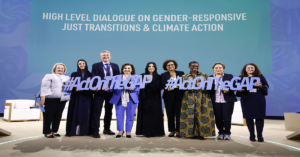Physical Address
23,24,25 & 26, 2nd Floor, Software Technology Park India, Opp: Garware Stadium,MIDC, Chikalthana, Aurangabad, Maharashtra – 431001 India
Physical Address
23,24,25 & 26, 2nd Floor, Software Technology Park India, Opp: Garware Stadium,MIDC, Chikalthana, Aurangabad, Maharashtra – 431001 India

On the fifth day of COP28(December 4), a significant development emerged with the announcement of the COP28 Gender-Responsive Just Transitions & Climate Action Partnership, garnering endorsement from countries, including India and Sri Lanka. This initiative emphasizes the integration of gender considerations, advocates for just transitions to a low-carbon economy, and addresses the vulnerabilities of groups such as women and girls in the context of climate change. The partnership reflects a global commitment to inclusive and equitable climate action, underscoring the importance of recognizing and mitigating the diverse impacts of environmental challenges while promoting social justice.
During the Gender Equality Day of COP28, ministers and senior officials gathered for a series of discussions under the auspices of the UNFCCC and led by COP28’s UN Climate Change High-Level Champion, Razan Al Mubarak. The aim was to secure a just transition that is responsive to gender considerations, facilitating the implementation of the Paris Agreement.
The high-level dialogue concluded with the introduction of the COP28 Gender-Responsive Just Transitions & Climate Action Partnership by the COP28 Presidency, garnering support from more than 60 Parties. This Partnership encompasses a set of commitments, spanning actions related to data, finance, and equal opportunities. The progress of these initiatives will be assessed during a subsequent meeting at COP31.
As highlighted by the International Labor Organization (ILO), global warming and environmental degradation jeopardize 1.2 billion jobs, equivalent to 40 percent of the worldwide labor force. Women are anticipated to bear the brunt, given their substantial presence in sectors highly vulnerable to climate change.
The shift toward a low-carbon and sustainable economy will result in the reconfiguration of existing jobs, the creation of new roles, and the potential loss of certain positions. In response, ministers and high-level officials have committed to a series of measures to bolster women’s economic empowerment and safeguard their livelihoods throughout this transition.
Razan Al Mubarak emphasized, “Climate change is not gender neutral; it disproportionately impacts women and girls. Addressing this crisis requires reshaping the global financial system and directing finance toward the regions and populations most in need. Simultaneously, investing in women’s economic empowerment is crucial to ensuring an inclusive transition.”
The new partnership aligns with objectives outlined in the United Nations Framework Convention on Climate Change (UNFCCC) Gender Action Plan. The COP28 Gender-Responsive Just Transitions & Climate Action Partnership revolves around three central pillars: enhanced data quality for informed decision-making in transition planning, more efficient finance allocation to regions most affected by climate change, and education, skills, and capacity building to support individual participation in transitions.
Sima Bahous, Executive Director of UN Women, asserted, “The rights of women and girls must be at the core of climate action, including here at COP28. Inclusive decision-making is essential to amplify the voices of feminists, youth, indigenous, and grassroots movements from local to global levels.”
Predictions indicate that by mid-century, climate change could drive up to 158 million more women and girls into poverty globally, surpassing the corresponding figures for men and boys by 16 million. Bridging the gender data gap is critical to tailoring climate finance to the specific needs of women and girls, particularly those in climate-vulnerable regions.